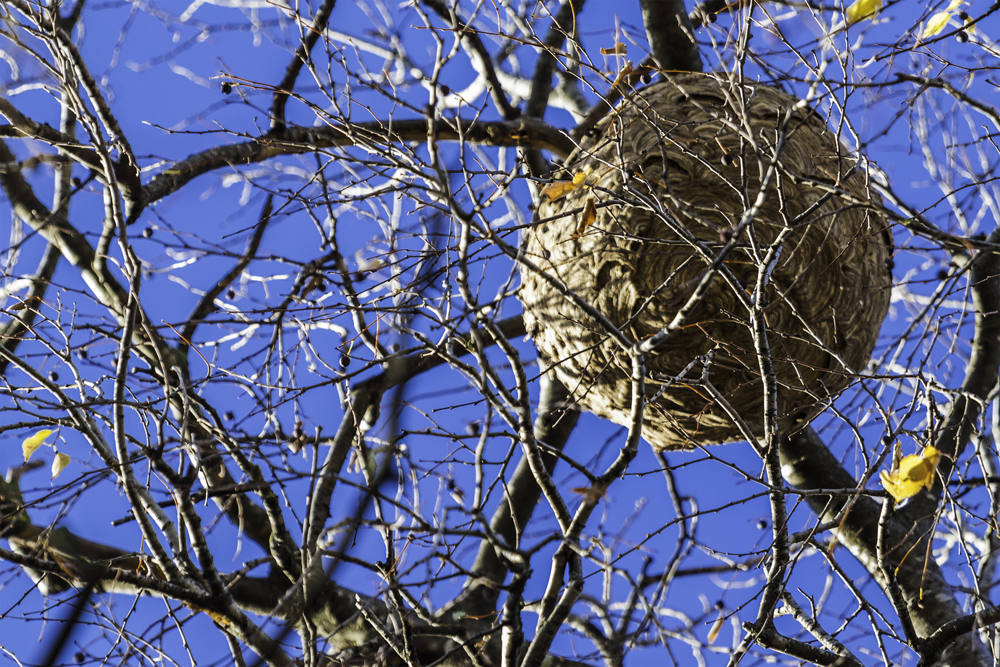Many stinging insect types look similar, and
proper identification is key to proper control and treatment. In Sussex and Kent County, Delaware, there are many types of stinging insects ranging from the typical well-known and more aggressive variety of Paper Wasps, Bald Faced Hornets, European Hornets, and Yellow Jackets that are social, predatory and territorial. There is also the more unknown, more solitary types of stinging insects which include Carpenter Bees, Mud Daubers/Mud Wasps, Digger Wasps / Cicada Killer Wasps, Minor Bees, Sweat Bees and even Velvet Ants/Cow Killer Ants. While some of these may be less aggressive, they will sting under certain circumstances or if they or their nest feels threatened.
There are some
proactive measures
you can take to reduce the possibility of stinging insect activity near and in your home or yard. Make sure to seal all possible entry points, voids and openings that stinging insects may enter your home through. These include eaves, windows, vents, bathroom and kitchen exhaust fans, fireplace dampers, and any other gaps or openings that they can get through. Like all living things, stinging insects require food and water. Keep your yard clean of debris, making sure trash cans always have a lid and are kept away from the house. Clean areas around fruit trees including fruits that fall to the ground. These are attractants for some stinging insects. Eliminate the food supply of the predatory wasps and hornets and Yellow Jackets.
Predatory stinging insects eat bugs so regular pest control services will make your home less attractive to stinging insects. Check for areas with standing water that will supply a readily available water source for stinging insects. This is also recommended for mosquito control.
Routinely check for old, empty nests around your home and property and remove (remove only after no activity in the nest is confirmed). Some stinging insects will re-use the nest to start a colony. Seal and paint wood to deter Carpenter Bees. When you see a nest or activity from a stinging insect, immediate action should be taken. The more time that passes, the larger the colony will become, as well the possibility of additional nests or of someone getting stung. Lastly, and you probably already know this, do not disturb active nests or hives and stay away from the general vicinity of an active nest.
Attempting to remove a nest or hive yourself is not recommended. Do it yourself methods are unsafe and if not performed in a proper manner will cause a colony to become very agitated and aggressive. Hornets and Yellow Jackets will even emit a pheromone that will notify or warn other members of their colony of danger, causing a possible swarm and coordinated attack against what they perceive as the perpetrator - you.
Let the trained professionals at Integrity Pest Solutions make nest removal and treatment easy and safe for you and your family. Integrity Pest Solutions uses only targeted, controlled treatment methods to avoid any possible overspray or run off into areas that do not require treatment. In addition, we do not treat in any actively pollinating foliage including flowers, bushes and trees. Call Integrity Pest Solutions for safe treatment and nest removal so that the outside can be yours again.
We provide Stinging Insect Services in Delaware for:
- Bald-Faced Hornets
- Carpenter Bees
- European Hornets
- Paper Wasps
- Yellow Jackets
Please Note: Integrity Pest Solutions does not treat Honeybees due to their important role in our ecosystem and their pollination benefits. When Honeybee activity or a nest is present, we will recommend a local bee keeper for the safe removal and relocation of the colony and nest. Honeybees, as with all stinging insects, will occasionally become aggressive and sting and may cause allergic reactions to those with allergies to bees.
Tips: Cover outside trash cans with lids. Sweet sugary foods and sodas may draw stinging insects.
Learn more about our services here

